Permissive Indulgent Parenting Style Although Stricter Than Permissive, It Is Not Nearly As Extreme As Authoritarian.
Permissive Indulgent Parenting Style. But They Don't Set Limits Or Are Very Inconsistent In Enforcing Boundaries.
SELAMAT MEMBACA!
Permissive parenting, also known as indulgent parenting, is a parenting style characterized by high responsiveness and low demandingness.
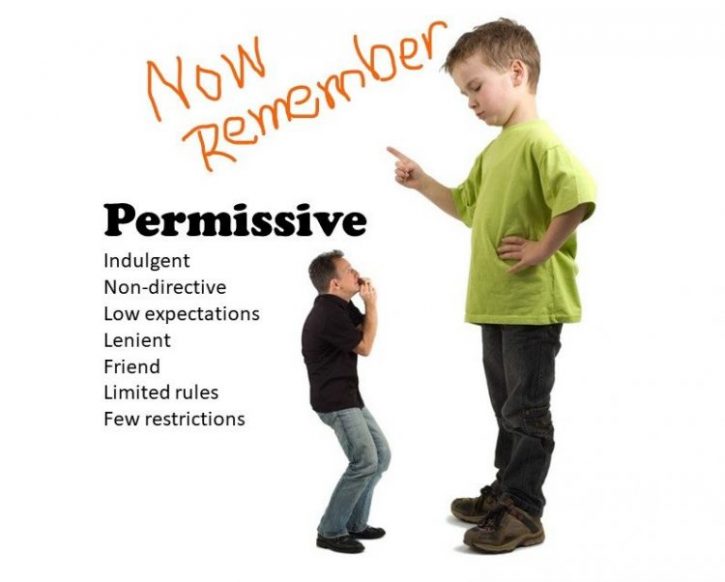
But they don't set limits or are very inconsistent in enforcing boundaries.
Permissive parenting is sometimes known as indulgent parenting.
Indulgent parenting is a style of parenting in which parents are very involved with their children but place few demands or controls on them. — john santrock, author of child development.

Permissive parenting, otherwise known as 'indulgent parenting' or 'lenient parenting,' is one of the parenting styles identified by diana baumrind (1).
Permissive parents are highly responsive towards their children's needs and nurture their talents and personality.
Permissive or indulgent parents are more responsive than demanding.
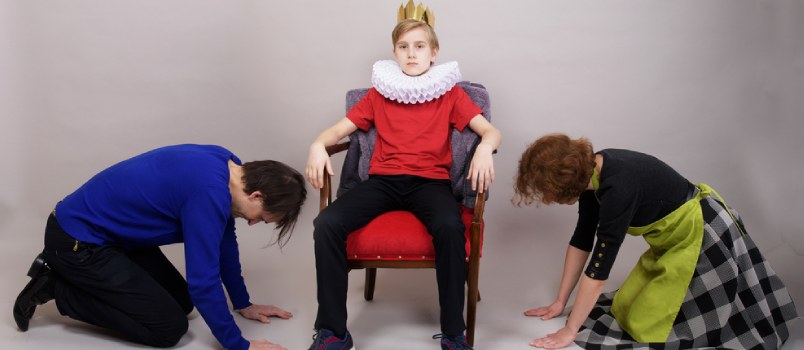
This style was a reaction to the fears of whole nations following wwii.
Permissive parents are often nontraditional and lenient.
Why some parents follow permissive parenting style.
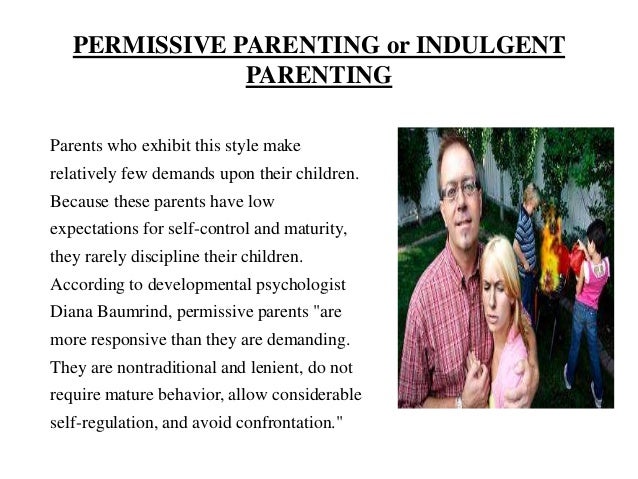
Parents adopt a very friendly parenting approach in this kind of parenting style, and they often do not expect their children to act or behave in a mature.
A parenting style is a psychological construct representing standard strategies that parents use in their child rearing.
The quality of parenting can be more essential than the quantity of time spent with.
What criteria must parents meet to be labeled permissive? here is an overview of permissive parenting:
How researchers define it, how researchers screen for it, and what studies really say about the effects of an indulgent parenting style.
€� a presentation of the permissive parenting style as it was originally conceptualized and defined by the all time famous developmental psychologist diana • an understanding of some of the existential reasons behind indulgent parenting:
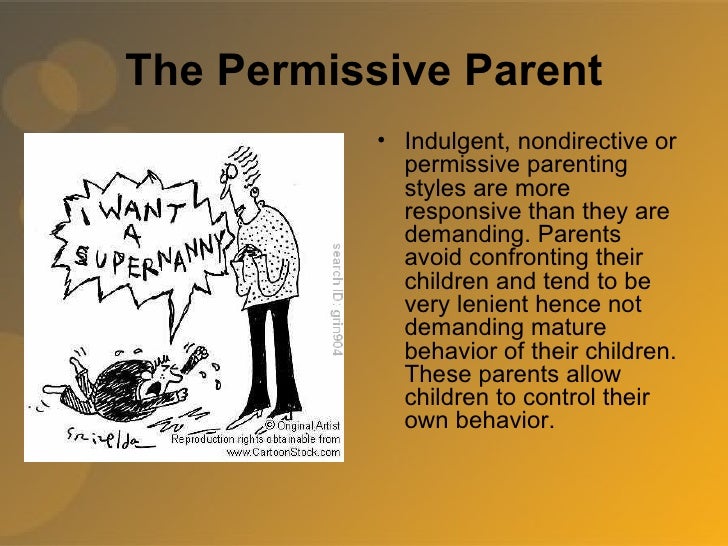
Parents do not help their children by being too permissive.
In fact, the development of positive character in children can be seriously hampered by over indulgent parenting.
The permissive parenting style is also known as indulgent parenting.

In this article, we'll explore what the p ermissive parenting style is, how to identify if you are a permissive parent, and how to decide if this.
Effects of permissive parenting style.
The developmental outcomes for children reared in permissive homes are also generally more negative.
The term was developed by psychologist diana baumrind sure, these parents may permit their kids to ride on public transportation, but that doesn't make them indulgent in every respect.
The permissive parenting style is an extremely relaxed approach where parents are generally warm, nurturing and affectionate.
However, they are overly accepting of their children's behaviour, good or bad.

Permissive or indulgent parents mostly let their children do what they want, and offer limited guidance or direction.
They are more like friends than parents.
Children may have input into goals.

Few of us fit neatly into one single parenting style, but rather raise children using a.
Permissive parents usually take on more of a friend role than a parent role.
They often encourage their children to talk with them about their problems, but they usually don't put much effort into discouraging poor.

The parenting style you adopt my differ based on your personality, preferences, or however, this doesn't mean permissive parents don't support their child.
If there's ever a serious issue, the parent will always step in to offer.
There are a number of what can be done about permissive parenting?

The four baumrind parenting styles are:
Permissive or indulgent parenting style.
Someone who parents in the permissive style is typically warm and kind to them.

Benefits of this negligent parenting style:
Indulgent parenting style mainly focuses on being friendly.
Permissive indulgent parenting maintain social order information processing theory shame and doubt concrete operational stage.

Permissive parenting is a style of parenting that involves a very indifferent, indulgent or compliant attitude towards your children.
Although stricter than permissive, it is not nearly as extreme as authoritarian.
This style encourages critical thinking and discussion within the family unit along with.

Parenting expert and director of parent 4 success, elizabeth o'shea told goodtoknow that permissive parenting is typically:
'a parenting style that involves.
Indulgent parenting is a style of parenting in which parents are very involved with their children but place few demands or controls on them.

The permissive parenting style often leads to parents that rarely if ever make any.
There are two extreme parenting styles.
On the one hand, there is the authoritarian parenting which is stereotypically practiced in china and the east.

Indulgent parenting style the permissive parenting style is characterized by a high level of nurturance and low levels of maturity demands from children, low levels of control, and low levels of communication between parent and child.
The permissive or indulgent parenting style develops an egocentric child.
Since authoritative parents give freedom to their children to express their ideas and opinions, that's why they're always open to communicate with their parents and other people.

This parenting style is characterized by parents who do not require.
Ternyata Tahan Kentut Bikin KeracunanPD Hancur Gegara Bau Badan, Ini Solusinya!!Manfaat Kunyah Makanan 33 KaliMelawan Pikun Dengan ApelPentingnya Makan Setelah OlahragaAwas, Bibit Kanker Ada Di Mobil!!Mengusir Komedo Membandel - Bagian 2Tips Jitu Deteksi Madu Palsu (Bagian 2)Gawat! Minum Air Dingin Picu Kanker!Fakta Salah Kafein KopiIndulgent parents are the type of parents who are more responsive than demanding. Permissive Indulgent Parenting Style. This parenting style is characterized by parents who do not require.
Permissive parents usually take on more of a friend role than a parent role.

Authoritative parenting is a style wherein the parents and children communicate amicably.
Parents set policies and explain the reason behind the rules to children and seek their opinion.
Permissive parenting is sometimes known as indulgent parenting.
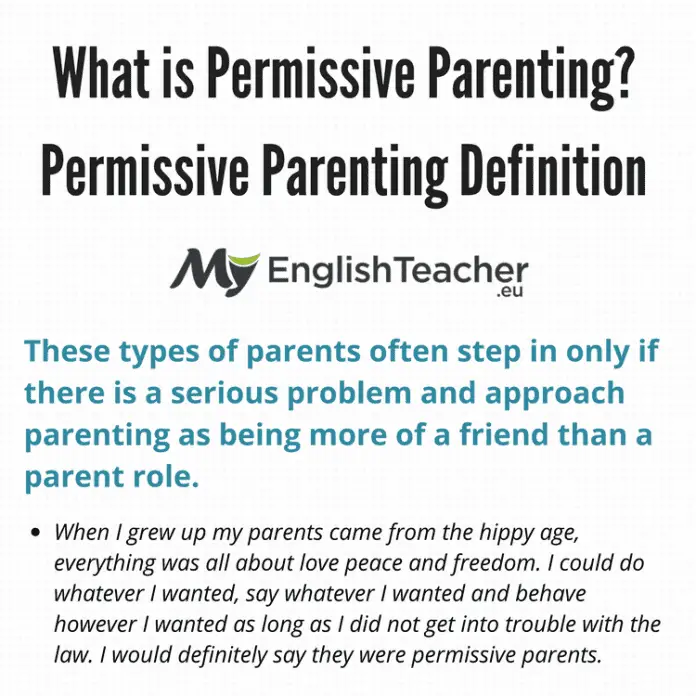
If you tend to be a pushover or struggle to enforce rules, consider looking for ways that you can develop some more authoritative parenting habits.
Permissive parenting definition, characteristics and effects.
Why permissive is not the same as authoritative and why authoritarian is not the permissive parenting, also known as indulgent parenting, is a parenting style characterized by high responsiveness and low demandingness.
But unlike permissive parents, authoritative parents don't each component of the authoritative parenting style seems to have its own benefits.
As noted above, inductive discipline—explaining the reasons for.
> authoritative parenting definition authoritative parenting is a parenting style characterized by high responsiveness and high demands.

Parents with this style are typically less nurturing.
Expectations are high with limited flexibility.
Expectations and goals are high but stated clearly.
What is my parenting style?
The parenting styles outlined by baumrind include the «authoritarian» style, the «authoritative» style, and the «permissive» style.
After further research was carried out on this topic, a fourth style was added to this list by psychologists john martin and eleanor maccoby.
It's essential to ensure your permissive parenting in this style of parenting, parents are lenient, and they only step in when there is a severe issue.
They are quite forgiving and.
The permissive parenting style is an extremely relaxed approach where parents are generally warm, nurturing and affectionate.

They feel their children are capable of making their own decisions with little parental guidance.
A parenting style is a psychological construct representing standard strategies that parents use in their child rearing.
The quality of parenting can be more essential than the quantity of time spent with.

Permissive parents are high on responsiveness and warmth;
But low on control and demandingness.
They generally avoid confrontation, asserting their relationship between authoritative parenting style and adolescent depressive symptomatology.

With permissive parenting the relationship dynamic between the parent and the child is the most like a friendship compared to all of the other parenting styles.
This parenting style is on the cold side of authoritative parenting.
It is like authoritative, but with little warmth towards their child.

The permissive parenting style in depth:
Taking diana baumrind's definition a step further by understanding the psychological fears of permissive parents.
Trying to find a universally applicable definition of permissiveness in relation to parenting is confusing to say the least.

Baumrind, authoritative parenting is characterized by high demands but also high responsiveness. kids of permissive parents are more likely to do poorly in school, and there are poor social and emotional consequences as well.
When parents are acting in the authoritative style, they focus on nurturing their children.
Authoritative parents support their children and the permissive style of parenting has many drawbacks.
Authoritative parenting style effects have been tested and used for generations, which makes it one of the best parenting styles in the world.
As your children grow and transform into capable and responsible individuals, they will appreciate you for having given them a good childhood.
Effects of permissive parenting style.

Permissive parents are low in demandingness and high in responsiveness.
From authoritative parenting to authoritarian parenting, here are the most common types of parenting styles and what to know about them.
Permissive parents are warm and nurturing, but tend to be lax (or inconsistent) in the rules and discipline department.

These parents are highly responsive to their children's what she found was four styles, those being authoritative, uninvolved, permissive, and disciplinarian (also known as authoritarian).
Then there is the permissive parenting (also known as indulgent or nondirective) which is the style commonly practiced in the west (this is authoritarian parents demand perfect grades because they believe that the child can get them.
If the child fails, authoritative parents believe that it is not.
/2794957-what-is-permissive-parenting-5b2c035943a103003654116b.png)
Generally, there are four different types of parenting styles.
These are authoritarian, permissive, authoritative, and uninvolved.
A person's style of parenting, in no way speaks about the level of love they have for their.
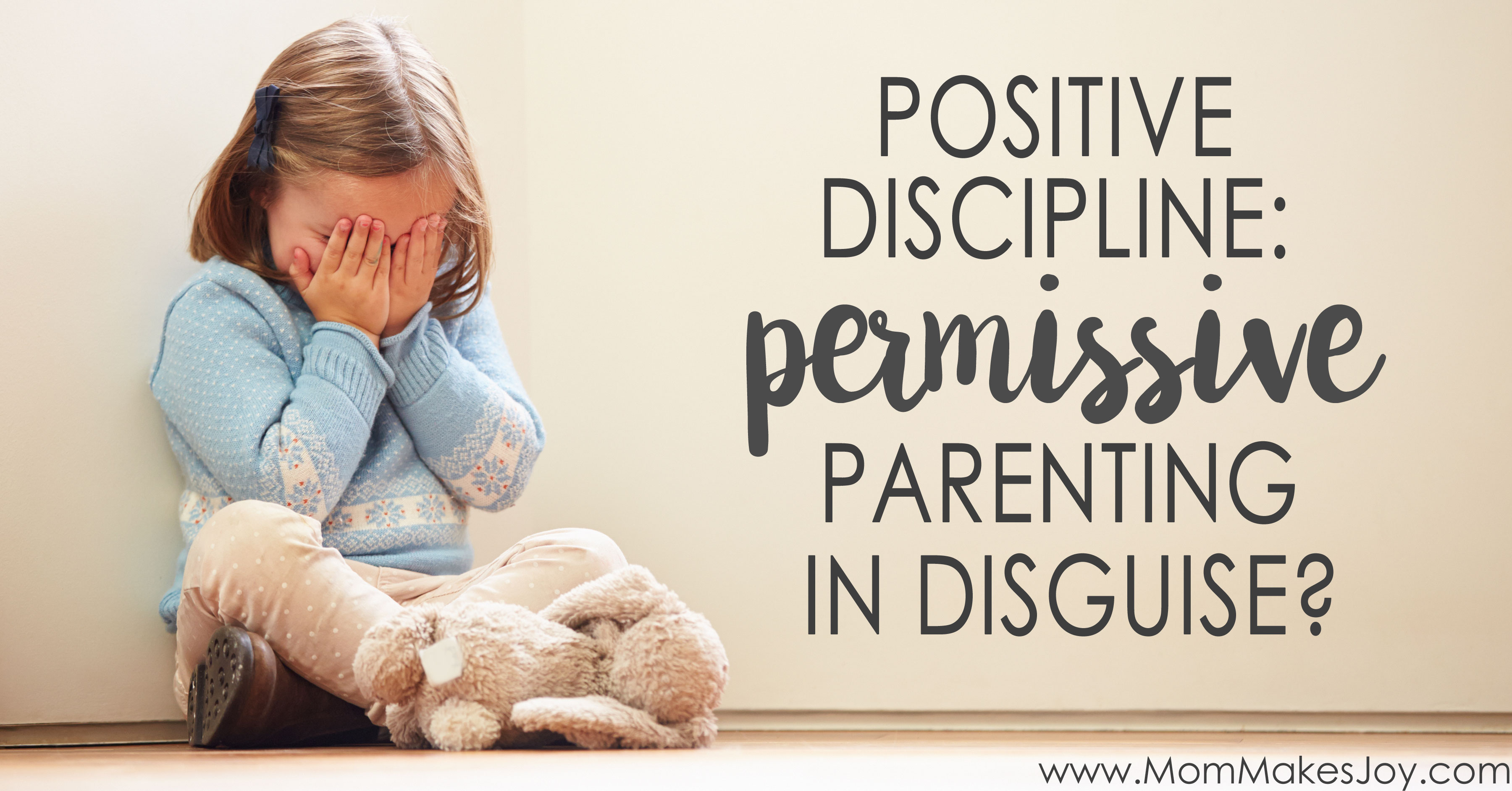
Decades, research in the united states based on in children, overweight relates to their parent's permissive style of parenting.
Permissive parents are deeply in touch with their overwhelming affection for their children, which is no small thing.
Although permissive and authoritative are the two main parenting styles presented here, they both have different meanings.
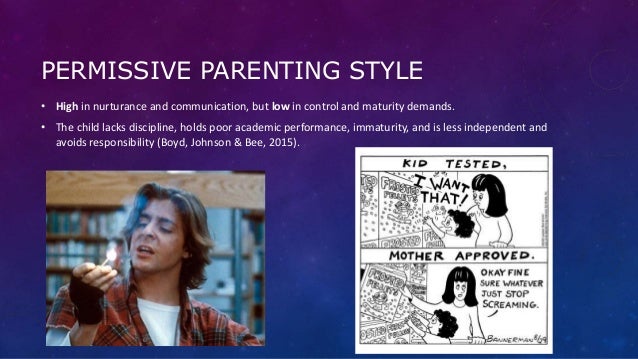
They want their children to know that there are certain limits to things you can or cannot do.
They are authoritarian, authoritative, permissive, and uninvolved.
Parents may not fit completely into just one of these styles, but could have some over lap.

3) permissive or indulgent parenting style:
Permissive parenting is a style of parenting that involves a very indifferent, indulgent or compliant attitude towards your children.
Permissive parenting is a style of parenting that involves a very indifferent, indulgent or compliant attitude towards your children. Permissive Indulgent Parenting Style. Permissive parenting could also be seen as being warm and nurturing when compared to a more authoritative style of parenting.Ternyata Bayam Adalah Sahabat Wanita9 Jenis-Jenis Kurma TerfavoritBuat Sendiri Minuman Detoxmu!!Resep Segar Nikmat Bihun Tom YamTernyata Kue Apem Bukan Kue Asli IndonesiaAmpas Kopi Jangan Buang! Ini Manfaatnya7 Makanan Pembangkit LibidoNanas, Hoax Vs FaktaResep Selai Nanas HomemadeTrik Menghilangkan Duri Ikan Bandeng
Comments
Post a Comment